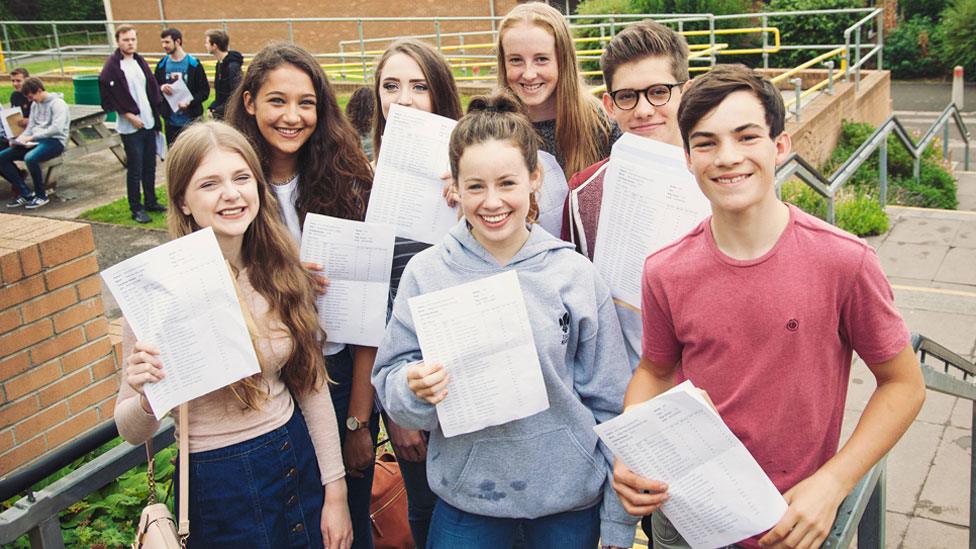GCSE A* to C pass rate in Wales lowest since 2006
- Published
- comments
Pupils in Wales collected their GCSE results after a system change
The GCSE A* to C pass rate in Wales has fallen to its lowest level since 2006, after some of the biggest changes in decades to the exams system.
The exams regulator said an increase in 15-year-olds sitting exams early was mainly to blame.
The A* to C pass rate fell to 62.8% after it had remained stable at 66.6% for three years.
The percentage of the highest A* to A grades also dipped to 17.9%, down from 19.4% in 2016.
Qualifications Wales had warned that an increase in early entries in some subjects was likely to mean lower results.
Kirsty Williams on the "unprecedented" number of early GCSE entries
The Joint Council for Qualifications (JCQ), which collates exam data for Wales, England and Northern Ireland, said changes in entry patterns - particularly for 15-year-olds - and the high proportion of pupils who took the two new mathematics GCSEs early in November, had a substantial impact on the results.
It said more students had "banked" a result and not returned to sit the exam again this summer - many whom have achieved a Grade C or above that would otherwise appear in these latest results.
As a consequence, it warned that reliable conclusions could not be drawn from direct comparisons between results this summer and the previous one, or between summer results across the UK.
Education Secretary Kirsty Williams said Wales has seen "some of the biggest changes in qualifications in decades" which had been "really challenging for pupils and teachers".
She said this was reflected in this year's overall GCSE A* to C grade pass rate.
Ms Williams said she was "concerned" about the high number of pupils being entered early for their exams and that the current situation was "unsustainable".
"We have signalled to schools that early entry should only be considered if it is in the interest of individual children, but what we've seen is entire cohorts of children being entered," she said.
Ms Williams added the "perverse incentives" that drive some schools to enter children early "should be taken out of the system".
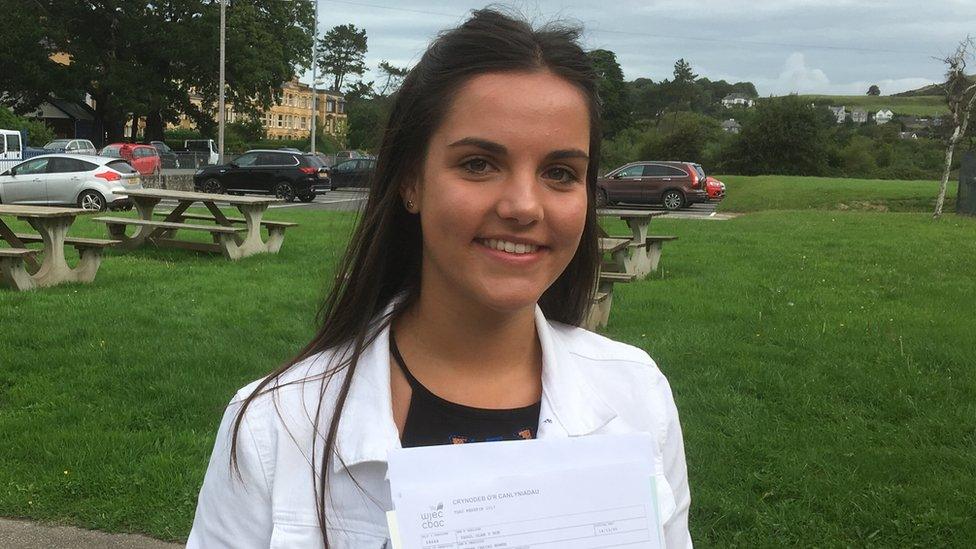
Ysgol Glan y Mor pupil Seren lived up to her name with 11 A*s
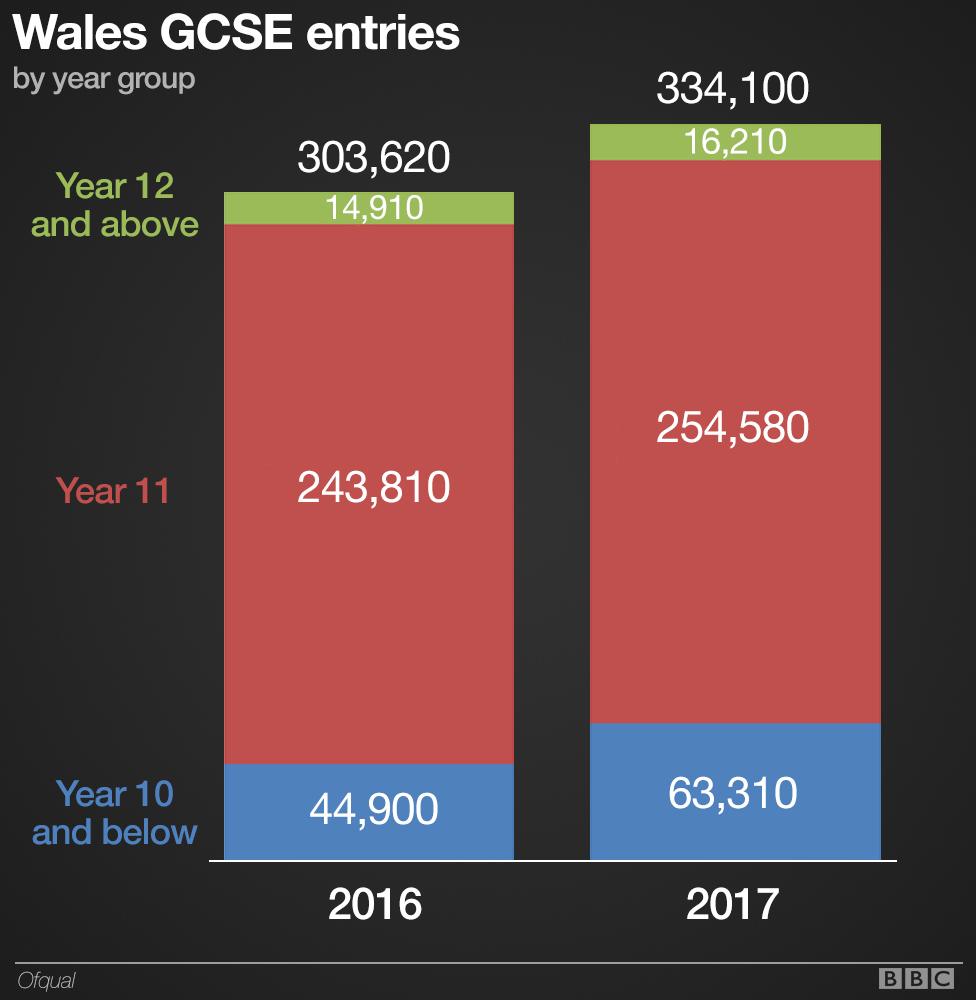
The overall A* to G pass rate was also down from 98.7% to 96.9%, but the percentage of the highest A* grades remained at 6.1%.
While the fall in grades has been linked to the increase in 15-year-olds sitting exams early, the performance of 16-year-olds also fell by 2.8% for A* to C grades.
This summer's 16-year-olds were the first to complete courses in six reformed GCSE examinations.
But Qualifications Wales said their performance in these exams had either improved or remained stable.
While Welsh pupils were still graded A* to G, students in England received new numerical grades for some subjects.

Reformed exams
The new GCSEs are in English language, English literature, Welsh language, Welsh literature, mathematics: numeracy and mathematics, and the regulator said it was confident standards had been maintained.
Mathematics: numeracy was first examined in November and, by collating data for the two mathematics GCSEs from November and this summer, the A* to C pass rate for 16-year-olds was 60% in GCSE mathematics and 58.5% in mathematics: numeracy.
The A* to C pass rate for GCSE mathematics was down on the previous year's figure of 65.6%.
In English language, the JCQ said the lower overall results for English language were explained by the lower outcomes of the large number of 15-year-olds entered for the exam.
About 65% of all Year 10 students were entered for the exam this summer, but the results for 16-year-olds saw an improvement according to the exams board.
There was also an increase in early entries for GCSE Welsh language and results have remained stable for 16-year-olds. Welsh literature saw a small improvement in performance but a substantial fall in entries.
There was also a substantial 44% fall in entries for English literature, but an improvement in results.

The fall in the number of students taking modern languages continued, with a 10.9% drop in entries for French and a 30.8% reduction in German, while Spanish saw a small increase.
The JCQ said French results were considerably lower at the top grades, while German results were up.
It also highlighted a trend towards reduced entries in a range of "optional" subjects.
Meanwhile, girls continued to outperform boys with 67.2% of girls' grades at A* to C compared with 58.2% for boys.
The gap grew this year for the A* grade, with an increase in the percentage of the highest grade for girls to 7.5% while the figure for boys was 4.7%.
Speaking at Cefn Saeson school in Neath, Kirsty Williams said: "We can be proud of the way our pupils and teachers have handled the introduction of these new qualifications that are playing a vital role in raising standards."
Ms Williams also pointed out that for 16-year-olds only, the percentage achieving A* to C was 66.8%.

Imogen Lloyd and Hollie Jones received their GCSE results at Ffynone House School, Swansea
But she said: "Many of these pupils, who are taking exams before they have completed their two years of GCSE study, have not had the opportunity to reach their full potential.
"This is putting unnecessary pressure on pupils, teachers and also puts an extra strain on school budgets.
"I will respond to Qualifications Wales' rapid review of this issue when I receive it in October, but the current situation is unsustainable and all options are on the table."
Darren Millar AM, the Welsh Conservatives' shadow education secretary, said there had been a "troubling decline" in attainment.
He also called on Ms Williams to rethink her reform of the schools curriculum.
"The drop in attainment of grades A* to C and plummet in uptake of modern foreign languages are particularly disturbing, and do not bode well for Wales' future economic prospects," Mr Millar said.
Plaid Cymru's shadow cabinet secretary for education, Llyr Gruffydd, said: "We know that the new system will take some time to bed down and this will show in the results.
"The Welsh Government now needs to consider these results and what they mean for students who are sitting GCSEs next year and the year after."
Focus on 'fairness' in grading new GCSEs in Wales, said Emyr George
There were a total of 334,100 entries for the exams, up from 303,620 last summer.
Emyr George, from Qualifications Wales, said the increase in exam entries was mainly driven by the extra maths GCSE and the increase in Year 10 entries in some subjects.
He said there had been an increase of about 40% in Year 10s awarded grades this summer.
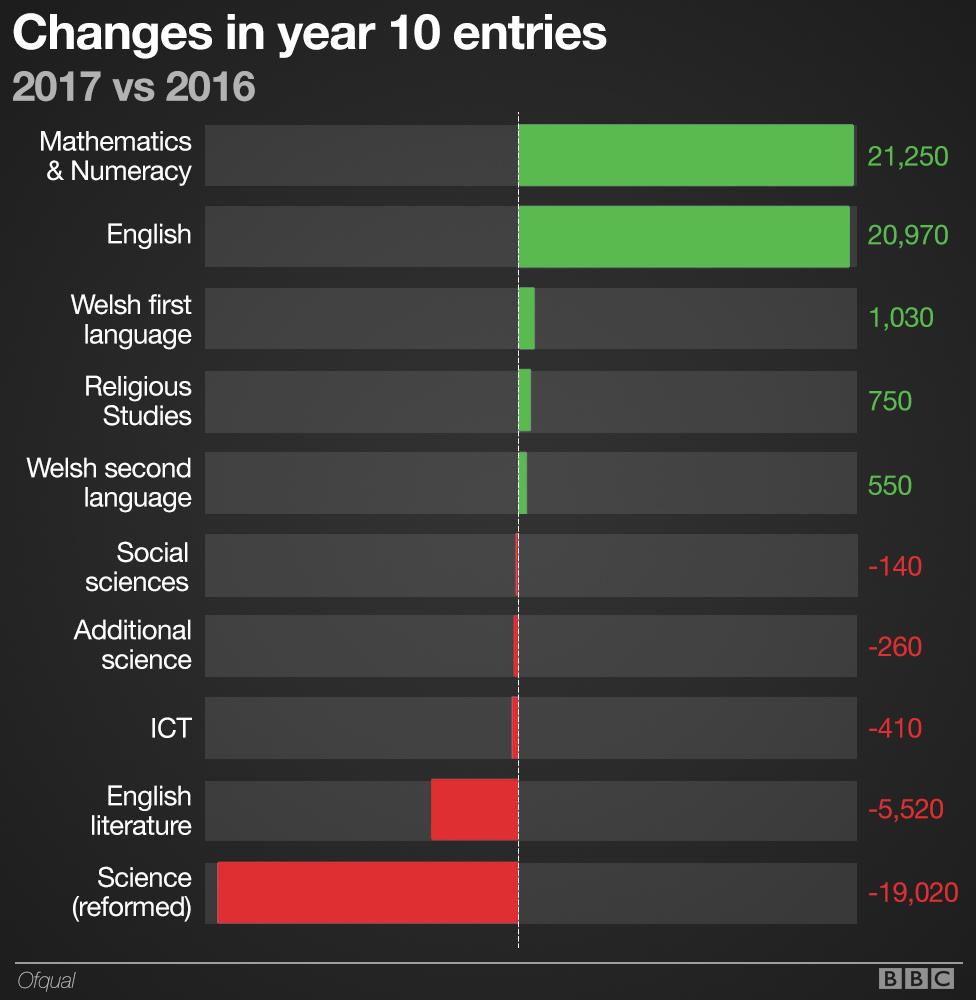
It appears to be the main reason why the overall number of entries for English language this summer is about 24,000 higher than last year at 59,050.
In England, English and maths will be graded numerically this year for the first time from nine at the top end of the scale down to one.
The changes make it more difficult to compare the overall performance of pupils in different parts of the UK.
Scotland has a separate system while Northern Ireland is also keeping the A* to G grading, although some pupils have been taking numerically graded exams.
But the exams boards have published all-UK data which gives cumulative figures for those who achieved A* to C (4 to 9 in England) and A*to A (7 to 9 in England).
It shows that the overall pass rate is stable compared to last year at 98.4%, with slight decreases in the A* to A (20% down from 20.5%) and A* to C (66.3% down from 66.9%).
The regulator says the qualifications remain broadly equivalent across the nations.
Mr George said: "It's quite a significant year and one we've been preparing for to ensure that those students taking the new qualifications in Wales this year can be confident that they've not been unfairly disadvantaged in any way by being the first to tackle those qualifications."
- Published24 August 2017

- Published24 August 2017

- Published24 August 2017

- Published9 July 2017
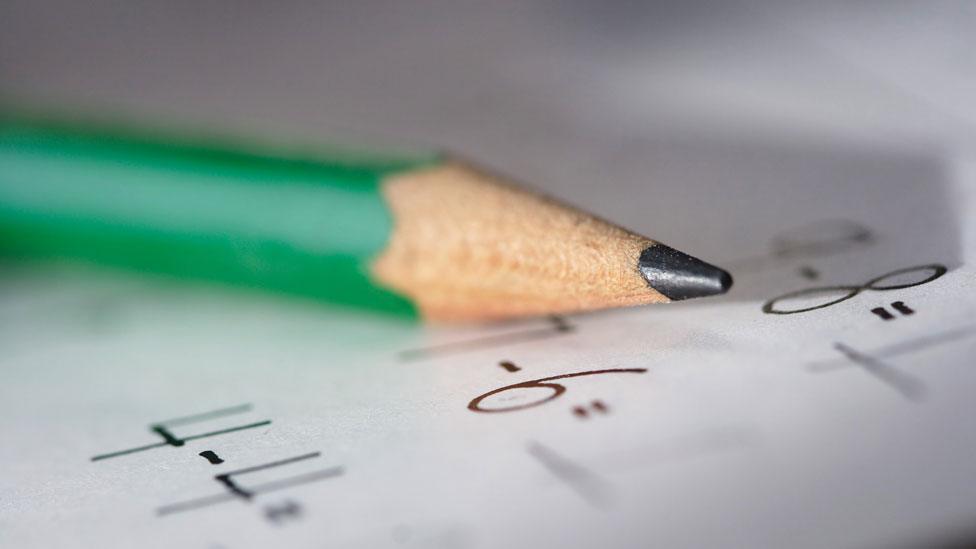
- Published19 January 2017

- Published17 April 2017

- Published24 August 2016
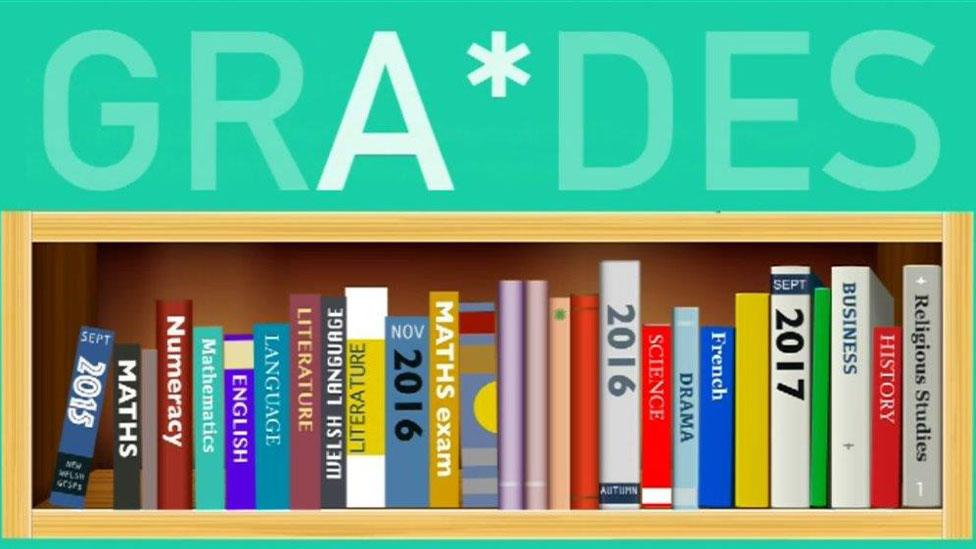
- Published25 August 2016

- Published25 August 2016
